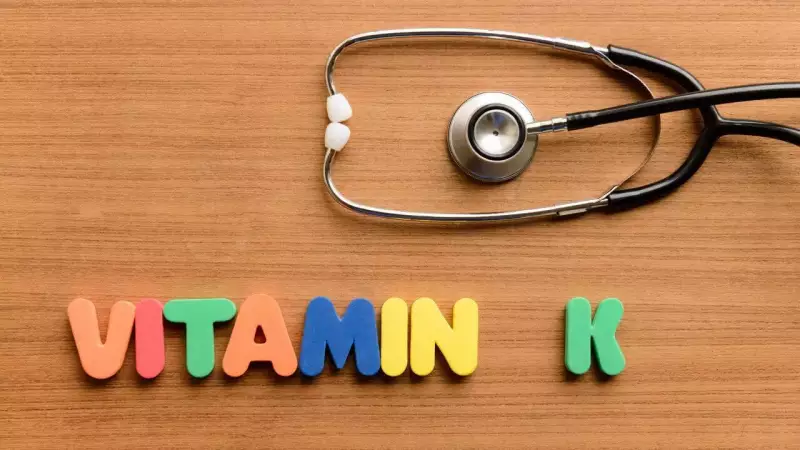
While nutrients like Vitamin D and calcium often steal the spotlight, vitamin K quietly performs several crucial functions that keep our bodies functioning optimally. Recent medical research reveals that deficiency in this essential vitamin is more widespread than previously thought, particularly affecting people with digestive disorders, restrictive diets, or those on long-term medications.
The Silent Crisis: Understanding Vitamin K's Vital Role
Vitamin K exists in two natural forms that work together to maintain bodily balance. Phylloquinone (vitamin K1) primarily comes from leafy green vegetables, while menaquinones (vitamin K2) are produced by gut bacteria and found in fermented foods and animal products. These compounds activate proteins that regulate blood coagulation, calcium distribution, and tissue integrity throughout the body.
When vitamin K levels drop too low, these proteins remain inactive, disrupting the body's ability to manage bleeding and maintain healthy bones. The liver plays a central role in this process, using vitamin K to convert clotting precursors into active forms that stop bleeding when blood vessels get injured. Simultaneously, vitamin K-dependent proteins like osteocalcin and matrix Gla protein ensure calcium gets directed into bones instead of accumulating in arteries.
Recognizing the Warning Signs Before It's Too Late
Vitamin K deficiency often develops silently, with symptoms becoming apparent only after significant damage has occurred. According to research published in StatPearls, several warning signs indicate potential deficiency:
Prolonged bleeding from minor cuts or injuries occurs due to insufficient clotting factors. Unexplained bruising in unusual areas happens because blood vessels become fragile without adequate clotting protection. Frequent nosebleeds and bleeding gums often serve as early indicators that something is wrong.
More serious symptoms include blood in stool or urine, which may appear as dark, tar-like stools or red-colored urine. Women might experience unusually heavy menstrual cycles that are sometimes mistaken for hormonal imbalance. Newborns face particular vulnerability since they're born with limited vitamin K reserves, making them susceptible to vitamin K deficiency bleeding (VKDB), a rare but serious condition.
Laboratory tests typically show prolonged clotting times before visible symptoms emerge. If left untreated, severe deficiency can lead to internal hemorrhage or contribute to reduced bone density over time.
Who Faces the Highest Risk and Why It Matters
Certain population groups face elevated risk of developing vitamin K deficiency due to absorption issues or medical conditions. People with gastrointestinal disorders like Crohn's disease, celiac disease, or ulcerative colitis often struggle to absorb fat-soluble vitamins effectively. Extended antibiotic use can deplete beneficial gut bacteria that synthesize vitamin K2.
Older adults, individuals with liver disease, and those on long-term anticoagulant medications such as warfarin also face higher risk. The liver not only stores vitamin K but also activates the enzymes that depend on it. When liver function becomes impaired, even normal dietary intake might not meet physiological demands.
Beyond Bleeding: The Broader Health Implications
Vitamin K's impact extends far beyond blood coagulation, significantly affecting bone and cardiovascular health. Deficiency can impair osteocalcin activation, a key protein responsible for binding calcium to the bone matrix, leading to weaker bones and increased osteoporosis risk. Simultaneously, low vitamin K levels reduce matrix Gla protein activity, allowing calcium to accumulate in arteries and contributing to vascular stiffness and higher cardiovascular risk.
Emerging studies suggest vitamin K may also influence brain health by contributing to sphingolipid synthesis, which maintains neuronal structure and communication. Although the connection between vitamin K and neurological function requires further exploration, these findings highlight its importance in overall metabolic balance and tissue health.
Practical Steps to Prevent and Reverse Deficiency
Preventing vitamin K deficiency primarily involves maintaining a nutrient-rich diet and supporting healthy absorption. Key strategies include consuming green leafy vegetables like kale, spinach, collard greens, and broccoli for vitamin K1, while incorporating fermented foods such as natto, cheese, and yogurt for vitamin K2.
For individuals unable to obtain adequate vitamin K through diet alone, supplements can help restore normal levels under medical supervision. In clinical settings, newborns receive vitamin K injections to prevent VKDB, while adults with severe deficiency or absorption problems may get vitamin K orally or through injections.
Addressing underlying causes by managing gut conditions, improving liver health, and adjusting medications that interfere with vitamin K absorption proves equally important. Individuals on anticoagulants or with chronic illnesses should undergo regular clotting assessments to maintain safe and effective vitamin K balance.
These preventive measures not only reduce bleeding risk but also strengthen bones, support cardiovascular resilience, and sustain overall physiological stability for long-term health maintenance.






